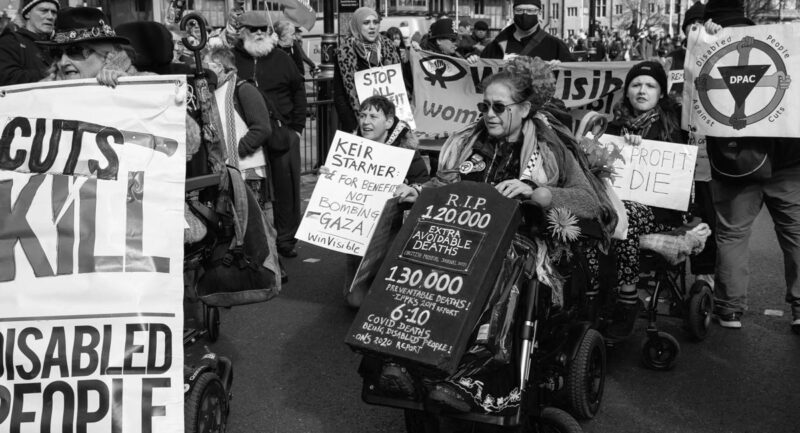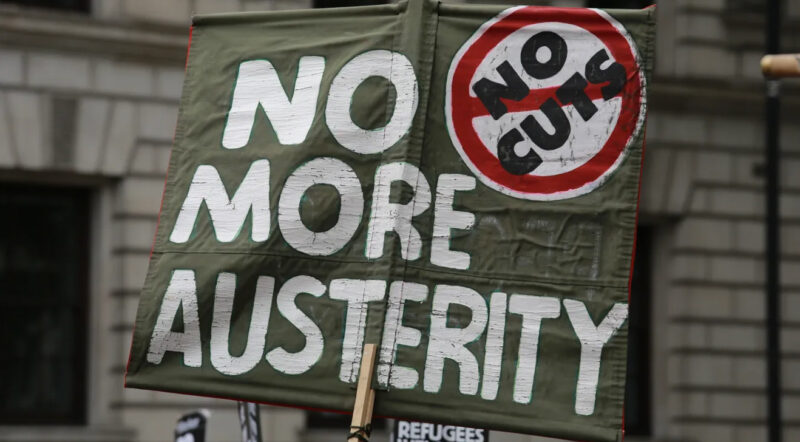The growing social crisis in Britain
 The government’s policies are making things much worse, writes John Bowman, particularly for the most vulnerable
The government’s policies are making things much worse, writes John Bowman, particularly for the most vulnerable
George Osbourne’s Autumn Statement on 29 November announced a whole raft of new attacks on living standards: capping public sector pay rises at one percent, slashing 710,000 jobs, confirming the rising of the pension age to 67, and much more besides.
But – and perhaps we should have come to expect this – the Institute for Fiscal Studies said that higher income families would receive a modest gain from the new government proposals overall, whilst the bottom 20 per cent of families would stand the most to lose.
For those who’ve suffered the worst of the cuts since the Tories got to power it is to state the obvious that the rich are getting richer, and the poor are getting poorer in today’s Britain. But this doesn’t make looking at the extent to which hardship and poverty has soared over the last 18 months any less shocking.
We discovered, thanks to the Office of Budget Responsibility, that supposed “scaremongering” from the trade unions and the TUC over the potential impact of cuts were in fact dramatic underestimates. The 400,000 public sector jobs that we were warned could be lost, is in fact likely to be almost double that. When the Local Government Association looked at the impact of job losses in local councils, Eric Pickles first said that they were drawn up “on the back of a fag packet”. If only they had been – the truth is that 145,000 council jobs have already been axed as a result, devastating the workforce and the communities they serve.
And so whilst estimations from the OBR on the eve of the N30 strike – predicting unemployment at 8.6 per cent next year – made for pretty grim reading, it’s worth bearing in mind that the reality could be much worse. The Office cannot possibly predict the impact of an increasingly likely Eurozone crisis, or a crash in Chinese, Indian or Brazilian markets that may yet be on the cards. These are just a couple of examples of what could happen in such a turbulent world where an entire system is in crisis.
Youth Unemployment
Some of the most worrying and widely publicised statistics have been over youth unemployment, and the number of those not in employment, education or training, nicknamed ‘NEETs’ by the press.
The taking away of Education Maintenance Allowance, the university graduates adding to the job centre queues and those not sure where to turn after tuition fees were tripled is already having an enormous impact on young people.
Youth unemployment is now well over 1 million, but this figure disguises the immense regional differences between different areas of the country, the north of Britain particularly hit by public sector and manufacturing job losses. In Leigh, Greater Manchester, there has been an 89 per cent rise in youth unemployment since the general election. In Birmingham, it has risen by 50 per cent, described as “drifting towards disaster” by Labour MP Liam Byrne – 4,775 have been unemployed for 6 months or more. In Leeds, the figure is around 60 per cent since January.
It’s no exaggeration that this amounts to an unemployment crisis for young people – and whilst the government have unveiled a £1bn plan to get youth back to work, no scheme will be able help young people into jobs which simply don’t exist. With the raising of the pension age to 67 denying job vacancies for the young, the situation doesn’t look set to improve anytime soon – the opposite looks set to be the case.
Pension Poverty
Of course that’s not to say that the aged have done well out of Tory Britain. Rising fuel costs have pushed fuel poverty up by 25 per cent, whilst private sector pensions schemes changing their measures of inflation have left those expecting a modest £10,000 pension losing £20,000 over the course of their retirement.
With more than five million households now spending 10 per cent of their income on fuel to heat their homes after greedy energy giants such as British Gas raised prices by 18 per cent, this is no joke and lives will be lost. Last year that figure was 25,700. This year it’s likely to be much worse.
The rich
Contrast this with the vastly increasing wealth of the rich – the average annual salary of the top 100 company bosses in London was £4.2 million according to a year long study by the High Pay Commission.
The study also tracked how many times chief executives got paid compared to their workers. Barclays Bank CEO receives 75 times the company average, and the head of BP, 63 times.
The pattern is quite easy to see. Those lobbying hardest for “deficit reduction”, cuts in pensions, pay, jobs and public services and increasing the cost of living are those who have gained and are gaining most from increasing inequality in Britain over the last ten years.
With Tory ministers considering abolishing the 50p tax rate, no wonder protesters have been camping in financial zones to demonstrate against the “1%” and calling for a redistribution of wealth.
The truth is that wealth has been redistributed significantly over the last ten years, accelerating over the last eighteen months. The problem is that it’s been in the wrong direction.
Death by poverty: The story of Mark and Helen
 After leaving the army, Mark Mullins found it difficult to adjust to civilian life and find a new job. His wife Helen, suffering from learning difficulties was going through reassessment after reassessment to try and claim disability benefits, Mark unable to claim carers allowance until the assessment was approved.
After leaving the army, Mark Mullins found it difficult to adjust to civilian life and find a new job. His wife Helen, suffering from learning difficulties was going through reassessment after reassessment to try and claim disability benefits, Mark unable to claim carers allowance until the assessment was approved.
The Job Centre felt that Helen’s disabilities meant she was not a ‘job seeker’ and turned her away. The result was dire and absolute poverty for the couple. Unable to heat their home or use electricity, they kept the food they obtained from a soup kitchen (a twelve mile walk) in a shed.
Tragically, after filming a short documentary explaining their plight, the couple died in a suicide pact at the beginning of last month.
From the Tories’ mouth…
- Edwina Currie on ‘heating versus eating’: “I don’t believe people in this country go hungry”
- Philip Davies MP on pay for those with learning difficulties: “My view is that for some people the minimum wage might be more of a hindrance than a help”
- Greg Barker MP on the cuts: “We are making cuts that Margaret Thatcher, back in the 1980s, could only have dreamed of… this is an unprecedented piece of good housekeeping”
- Lord Young: “For the vast majority of people in the country today, they have never had it so good ever since this recession – this so-called recession – started”






